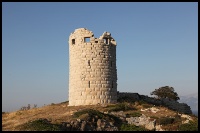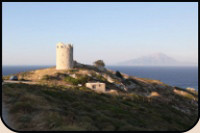
Drakanon
Ikaria (or Icaria) is a Greek island in the Aegean Sea. One of the most prominent ancient monuments on the island is the partially ruined watchtower called Drakanon (or Dracanum in Latin), which served as an inspiraton for the name and logo of Drakanon.
The watchtower and surrounding fortress were most likely erected by Athenians during the Second Athenian Confederacy (378–355 B.C.E.). It was manned by Athenians themselves, who monitored the movements of ships in the strategically important passage between Ikaria and the island of Samos. The tower was also used as a signal tower. Messages, even full sentences, were sent to neighbouring islands through the tower windows using a telegraphy system developed by Aeneas Tacitus.
The first city of Ancient Ikaria was Therma, but another one was built at the watchtower site. At the time this city was also called Drakanon, but nowadays it is known by the name Fanari.
The name Drakanon is derived from ancient Greek verb δέρκομαι (dérkomai) that means "see clearly". This epitomises the life and career of Dr Rekola, who believes one should never take anything for granted, just because somebody else says so. Everybody should always have a suitable level of scepticism and weigh information and claims against wider context and supporting evidence. This is the core ideology of science. This is also why Dr Rekola has devoted his life to education and public outreach.
Drakanon was founded in 2016 to enable Dr Rekola to sell his services as an educator, public lecturer and photographer initially in the Lehigh Valley region, Pennsylvania, USA, with imminent plans to expand operation both to United Kingdom and Finland.
Most of the historical information on Drakanon and Ikaria in these pages comes from the book "Ancient Icaria" by Anthony J. Papalas, 1981, Bolchazy-Carducci Publishers, Wauconda (IL), USA. ISBN: 0-86516-244-1
Misinformation?
According to Homeros (or Homer to English speakers) god Dionysos was possibly born in Drakanon. Some people have thought this means Drekanon, on the island of Kos, but this interpretation has been dismissed by Theocritos. Clearly the Drakanon in question was on Ikaria.

There is some uncertainty about the nature of Drakanon, the city. The references to the city are quite vague and it may have been only a small community living in the old fortress. No major archaeological excavation has taken place in the area to confirm this one way or the other.



